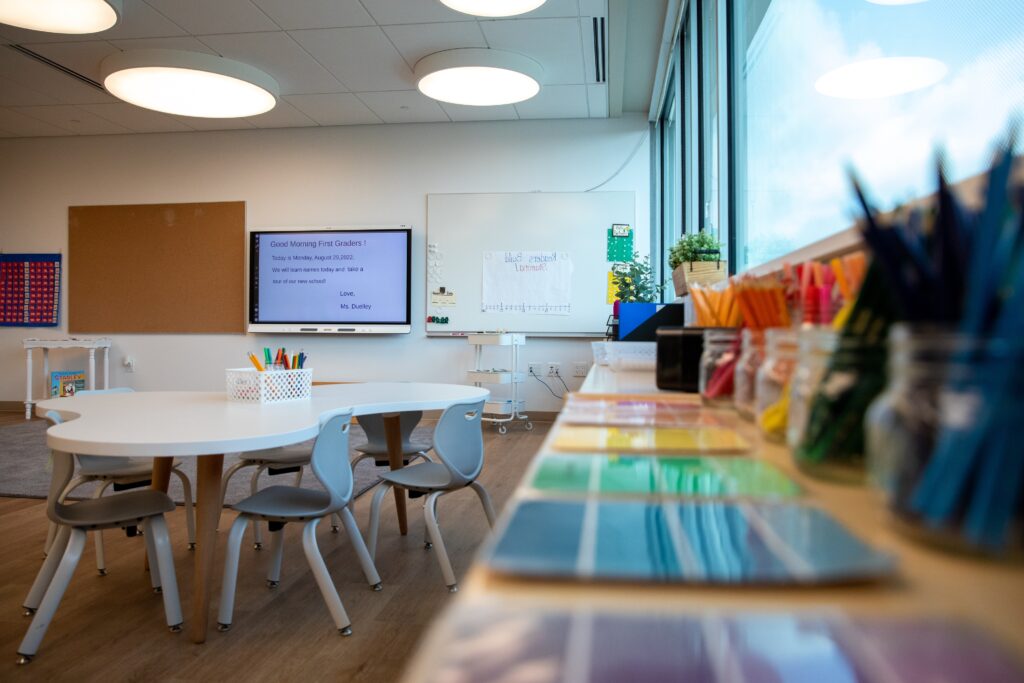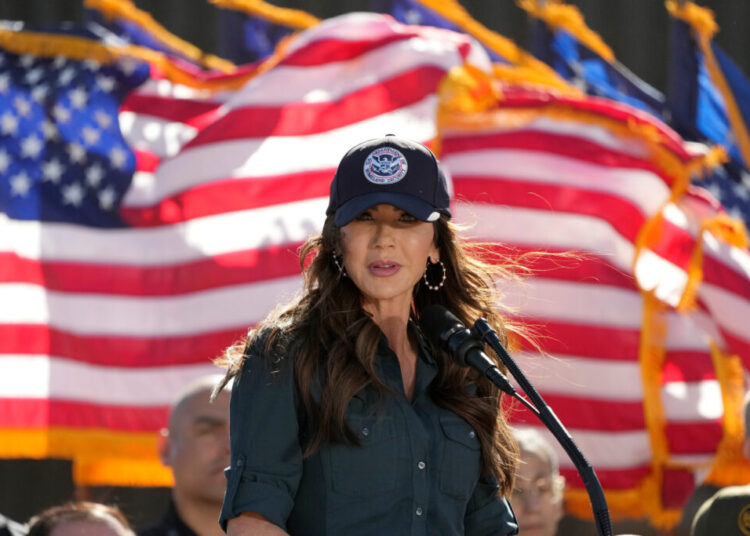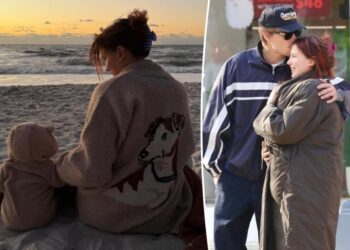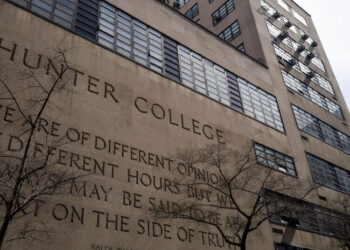D.C.’s behavioral health agency is walking back a commitment it made in 2018 to staff every public school with a licensed mental health clinician, following ongoing staffing challenges and a decision to cut ties with a dozen local nonprofits that provide school counseling, officials said.
The department, which runs mental health programs for D.C. Public Schools and charters, will now assign full-time clinicians to schools based on need, officials said. Other schools may get a part-time clinician or share staff with several other campuses. Telehealth services will be made available for high schools and schools with adult students.
By 2028, the agency’s director, Barbara J. Bazron, wants to run the city’s school-based behavioral health program in-house and not contract with local nonprofits. The change, she said, will allow the agency to ensure consistent training, quality and coordination among staff.
“The one-size-fits-all doesn’t work,” Meghan Sullivan, the agency’s deputy director of child, adolescent and family services, said of the changes at a recent D.C. Council hearing. “In this new plan, we’re looking at four different service delivery models, … and moving it in-house will allow us the flexibility of providing the resources in the appropriate level at each of the schools.”
The agency’s plan quietly took effect this fall and will be completed by the end of the 2027-28 school year, officials said. The D.C. Council cannot block or approve the plan, but its funding decisions could affect the agency’s ability to implement it.
The new approach — which behavioral health officials say will provide more students with access to services — comes amid a youth mental health crisis and as young people in the District clamor for more services. But it is being blasted by some youth advocates who say the plan was created without sufficient public input. One school leader said she has already lost a clinician.
The behavioral health agency has 40 of its own licensed clinicians, plus 98 staff who work for local nonprofits, assigned to schools this year, according to a spokesperson and a Nov. 1 staffing list. Roughly 100,000 students attend the city’s traditional public and charter schools.
Bringing the city’s school counseling program completely in-house will require the agency to go on a hiring spree — adding 113 full-time positions in three years — at a time when there are provider shortages and as school districts across the country try to increase counselor ranks. Bazron has indicated the agency could recruit from community organizations it has contracted with in the past.
Some school leaders say the changes will affect their ability to help children dealing with grief, homelessness, troubled relationships with parents and a host of other problems.
Natalie Smith, founder and chief executive of Global Citizens Public Charter School, said the behavioral health department hasn’t assigned a clinician to her Northeast Washington school since the 2023-24 academic year. In September, Smith said she was told that the school of almost 230 students would not be getting a new one.
“We had already been waiting a year” for a replacement, Smith said in an interview. The school already has a counselor, she said, but it’s not enough. “We have a ton of needs, and one school counselor cannot support all of the students’ needs. It’s just not possible.”
D.C. has made mental health a focus for schools since 2012, two years after a deadly shootout in Southeast Washington left three young people dead and six others wounded and underscored how the city had “deferred investment in youth behavioral health,” council members wrote at the time.
The incident triggered a law requiring the mayor to develop a plan to expand behavioral health services, with hopes of reducing truancy and youth crime by counseling students in crisis.
That plan went into effect during the 2018-19 school year and called on the behavioral health department to place one full-time clinician inside every public school by the 2021-22 school year. The agency tapped its own staff and contracted with local nonprofits, who sent clinicians to join existing school mental health teams of social workers, psychologists and other positions.
But the city never reached its goal. A Washington Post investigation this year found an increasing number of mental health-related jobs in schools have gone unfilled.
Roughly 60 percent of D.C.’s public schools, 158 campuses, have at least one licensed clinician, according to the city. There are 21 vacant positions, 19 of which are supposed to be staffed by community-based organizations, according to the November staffing list. Seventy schools have not been matched with a clinician at all this year.
Laura Maestas, chief executive of DC Prep, said the D.C. government has not fully staffed the charter network with clinicians in recent years. This year, two of its six schools received full-time counselors. Two others share one clinician.
So Maestas secured a grant to send three of her teachers to a two-year training program for school counselors. “There’s just not enough of them,” she said. “Let us solve the problem in a way that reflects the needs that we see within our school.”
Leaders at the behavioral health department said the D.C. Council has not provided enough funding to give every school a clinician. The pandemic also stalled the agency’s efforts, and a national shortage of mental health professionals has made hiring difficult, Bazron said.
Still, she told lawmakers the agency was able to add clinicians to more schools “despite the new challenges of remote learning and increased workforce shortages.” As the department ramps up hiring, Sullivan said the agency will expand recruiting efforts and offer competitive salaries.
Bazron also pointed a finger at the community-based nonprofits that have supplemented the health agency’s ranks. The director told lawmakers the organizations have had “limited success identifying and enrolling students in treatment” and that they struggle with “insufficient billing.”
The nonprofits are responsible for billing Medicaid and private insurance companies to pay clinicians, though the behavioral health department also kicks in funding to subsidize salaries. Most of the organizations, however, did not bill for the number of therapy sessions they reported during the last two school years, according to data provided by the city.
This has resulted in some programs operating “at a loss” and raised questions over whether the nonprofits are meeting with enough children who need counseling according to the behavioral health officials.
The agency did not provide comparable data for its own clinicians in an October report made to the D.C. Council.
Some community-based providers have railed against that criticism, saying that data is misleading. They reported insurance-related issues — some of the students they work with are uninsured, underinsured or have private out-of-network insurance, making billing a challenge, according to the October report.
“A claim can be in a variety of statuses. For example, it could be waiting to be paid. It could have been rejected but we’re challenging that denial,” Victoria Roberts, vice president of health services at Community of Hope, which provides clinicians at three schools, told city lawmakers. “When billing data has been requested, it’s been requested in such a way that it doesn’t really understand the nuances that are there.”
The community organizations also defended the impact of their work.
Julia DiGirolamo, a school-based therapist with Catholic Charities DC, told council members about a time when her work extended beyond the school counselor’s office and she helped a student’s family who was facing homelessness.
“Without school-based clinicians from community-based organizations like us, students … would fall through the cracks,” DiGirolamo said.
The post D.C. pulls back on vow to put mental health clinician in every public school
appeared first on Washington Post.




